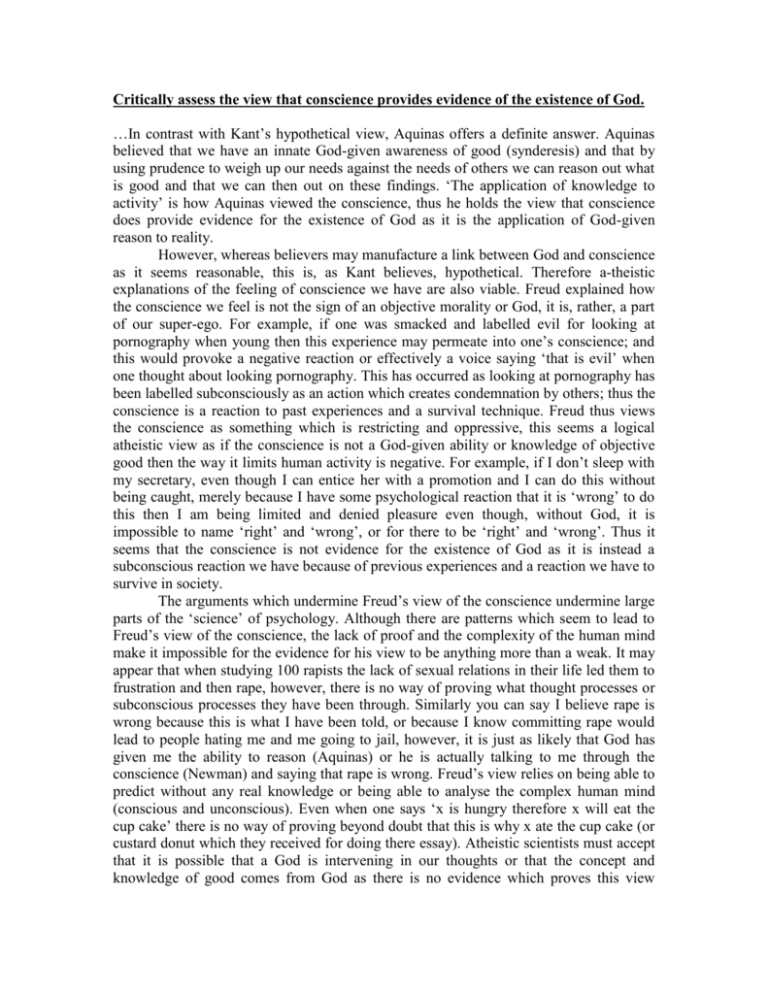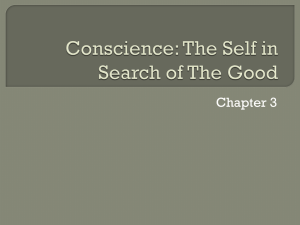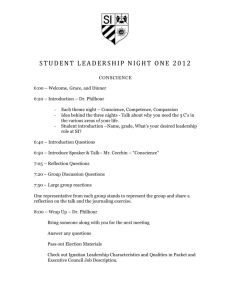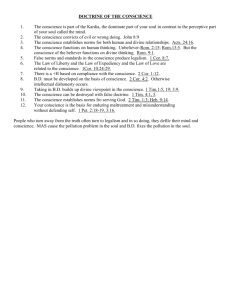Critically assess the view that conscience provides
advertisement

Critically assess the view that conscience provides evidence of the existence of God. …In contrast with Kant’s hypothetical view, Aquinas offers a definite answer. Aquinas believed that we have an innate God-given awareness of good (synderesis) and that by using prudence to weigh up our needs against the needs of others we can reason out what is good and that we can then out on these findings. ‘The application of knowledge to activity’ is how Aquinas viewed the conscience, thus he holds the view that conscience does provide evidence for the existence of God as it is the application of God-given reason to reality. However, whereas believers may manufacture a link between God and conscience as it seems reasonable, this is, as Kant believes, hypothetical. Therefore a-theistic explanations of the feeling of conscience we have are also viable. Freud explained how the conscience we feel is not the sign of an objective morality or God, it is, rather, a part of our super-ego. For example, if one was smacked and labelled evil for looking at pornography when young then this experience may permeate into one’s conscience; and this would provoke a negative reaction or effectively a voice saying ‘that is evil’ when one thought about looking pornography. This has occurred as looking at pornography has been labelled subconsciously as an action which creates condemnation by others; thus the conscience is a reaction to past experiences and a survival technique. Freud thus views the conscience as something which is restricting and oppressive, this seems a logical atheistic view as if the conscience is not a God-given ability or knowledge of objective good then the way it limits human activity is negative. For example, if I don’t sleep with my secretary, even though I can entice her with a promotion and I can do this without being caught, merely because I have some psychological reaction that it is ‘wrong’ to do this then I am being limited and denied pleasure even though, without God, it is impossible to name ‘right’ and ‘wrong’, or for there to be ‘right’ and ‘wrong’. Thus it seems that the conscience is not evidence for the existence of God as it is instead a subconscious reaction we have because of previous experiences and a reaction we have to survive in society. The arguments which undermine Freud’s view of the conscience undermine large parts of the ‘science’ of psychology. Although there are patterns which seem to lead to Freud’s view of the conscience, the lack of proof and the complexity of the human mind make it impossible for the evidence for his view to be anything more than a weak. It may appear that when studying 100 rapists the lack of sexual relations in their life led them to frustration and then rape, however, there is no way of proving what thought processes or subconscious processes they have been through. Similarly you can say I believe rape is wrong because this is what I have been told, or because I know committing rape would lead to people hating me and me going to jail, however, it is just as likely that God has given me the ability to reason (Aquinas) or he is actually talking to me through the conscience (Newman) and saying that rape is wrong. Freud’s view relies on being able to predict without any real knowledge or being able to analyse the complex human mind (conscious and unconscious). Even when one says ‘x is hungry therefore x will eat the cup cake’ there is no way of proving beyond doubt that this is why x ate the cup cake (or custard donut which they received for doing there essay). Atheistic scientists must accept that it is possible that a God is intervening in our thoughts or that the concept and knowledge of good comes from God as there is no evidence which proves this view wrong. Although Freud comes up with suggestions about how we could have a conscience if there is no God, he does not prove that conscience is not evidence for the existence of God. However, he does show that as conscience can be explained using scientific theory, and thus that it is not the solid evidence for the existence of God. Newman stated ‘Conscience is the aboriginal vicar of Christ’, that the conscience is essentially God talking to us. For Freud and other scientists this suggestion is absurd and almost laughable, however, as we have discussed there is no scientific fact which can disprove this. If we analyse Newman’s theory, even in such a way a psychologist would, then it appears there is logic and reason to it. Piaget argued that the conscience is developed while we grow into adulthood. He viewed how children growing up and playing act and observed that: first they would play alone, secondly children would play in a group and seek absolution, punishment and justice and third a development into a stage of discussion and compromise would occur. Just as these findings support Piaget’s view, it could argued, that they also back up Newman’s belief that God is talking to us through the conscience and to access this conscience properly we need support, help and guidance. Although some theists may claim that this is convincing evidence that science supports the conscience being a God-given ability, it seems clear that both Piaget and Newman are taking truths about how the world is, how we feel and how we develop to argue their case and to link together with their own opinions e.g. God or no god. In conclusion it seems that we cannot know truth about whether or not the conscience is or is not evidence for the existence of God. However, we can know some hypothetical truths. If one believes the conscience is objective then it is necessary to believe that it is God-given as scientific explanations for conscience rely on it being subjective and based on personal experience. This means that if one believes that it can ever be said with authority that something is ‘wrong’ then one must believe in God; objectivity relies on God and the process to realising this objective conscience and knowledge of good must be God-given. Conscience can be used as evidence for the existence as those who believe in any objective right or wrong have to believe in Godgiven conscience as this is the only way that objectivity could be established. It is meaningless to state that it is always wrong to rape if there is no divine law giver, the conscience and reason are evidence for God as they are the bodies which show that there is some divine spark and some knowledge of good within us. Whilst it can be argued that this feeling is instigated by the mind and society if this feeling is a lead to any sort of objective truth then it must be god-given. However, psychological and sociological explanations for conscience hold credibility and explain how the objective conscience which theists believe exists, may actually be a personal reaction to society or to ones own experiences. Whether or not the conscience can be used for evidence of God is subjective as the meaning of the word conscience to a theist is an objective, good knowledge of good and evil, however, to a psychologist the conscience is a neurosis, subjective and imprinted into the mind by society and experience. The fact that science is able to question the belief that the conscience is god-given to a significant degree means that conscience cannot be declared as an obligatory lead to existence. Science cannot prove without doubt that the conscience isn’t God-given and thus evidence for god and similarly theists cannot prove beyond doubt that conscience is God-given. This means that whilst conscience can be put forward as a part of God’s presence and thus existence the only way it can be convincing is if one is a believer in objective moral laws.









